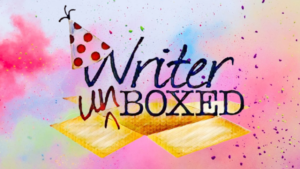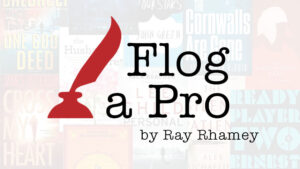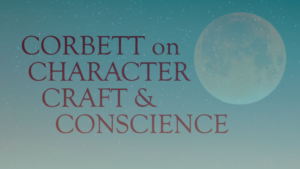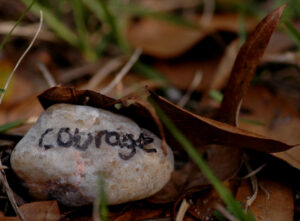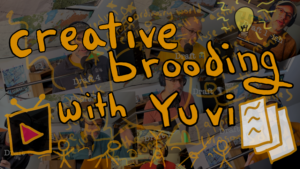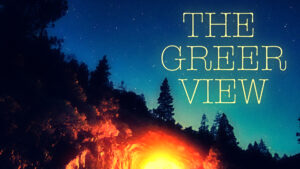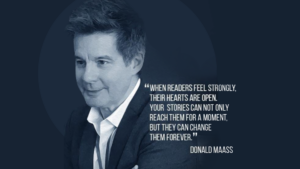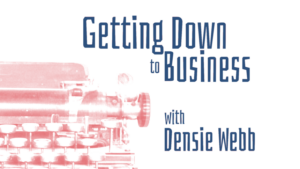REAL WORLD
Let’s talk about procrastination. That is, in case you haven’t named it, what you’re doing when you bake cupcakes, or work on that hobby, or clean all the baseboards, or doom scroll for hours instead of writing.
There are always reasons, large and small, not to work. My mid-back has been bugging me a lot. I’m worried about my mom, who doesn’t worry enough about herself. I have three cats who are all fifteen years old. Fifteen years old, people!
And you know…waves hands…the world. The terrors.
Yes. All those things. All the things distracting you, too.
But I’m here to tell you it’s time to get back to work.
First of all, it’s never about just procrastination. Something is always beneath it, something keeping you stuck, avoiding the page, avoiding even the place where you ordinarily write. What gets in the way of writing for you? Serious question. Think about this. What, exactly, is getting in your way?
The reasons for procrastinating are not all massive, big problems and thoughts. Often, they’re small things cluttering up the writing space like keys and mail on that one counter in the kitchen. Here are the three main things that get in the way:
Fear (also maybe anger)
Distractions
Real Life
FEAR AND ANGER
The first, fear and anger, cover a lot of ground.
That the work won’t be good enough
That you’ll reveal too much about yourself
That it won’t be as good as your last work
That your 8th grade teacher was right—you are a lousy writer
That the work is too serious
That the work is too frivolous
That the work is too “out there”
That the work is too bloody, too sexy, too violent, too quiet, about the wrong age of people, not very fashionable, too long, too short…fill in the blank
And then there are the other fears, about disappointing the people in your life, about worrying what will happen if you give so much time and attention to writing, taking it away from family, children, friends…and nothing ever comes of it. At the moment, a lot of us are fearful that there just not be any point.
There is a point. Trust me.
Anger is fear’s cousin, but it’s a lot more destructive, and people often avoid naming it because it feels shameful. Some things people get angry about are:
The unfairness of the publishing industrial complex
The fact that so and so got the deal you deserved and you are way better
You could write more if…..this one thing changed (you had a more supportive spouse, you could reduce your hours, you didn’t have a toddler…) Insert your own.
Are you angry? Is is getting in the way of your writing time?
If any of those fear or anger prompts resonate, I suggest you write them down. Naming a thing can rob it of a lot of power. If you are so inclined, journal about them or do some timed writings.
DISTRACTION
We live in a world that is more filled with distractions than it ever has been. We are addicted to our phones, texts, social media hits, emails, games, streaming, etc.
This is probably the most challenging aspect of writing in the modern […]
Read MoreI’ve started and stopped this essay a half dozen times. I’ve despaired. About so many things. The world. The country. Humanity. My loved ones. And down at the bottom of the list, my ability to ever write a coherent and moving sentence again. Besides, even if I could, what would it matter? It won’t change what’s done, won’t set the world right, probably won’t change a single mind or heart.
We were hit with a snowstorm where I live this week, and when it was over I went out in freezing temperatures and stomped around on snowshoes for a few hours, battling the cold and the ice and the way my left snowshoe always comes undone at the most inconvenient time, and when I’d finished, and I had no feeling left in my fingers and toes, I thought to myself Why did I do that? It was pointless and hard and didn’t change anything. What a waste of time. But then I thought some more. About the way my cheeks were glowing, how it had felt to not see another person for all that time, only trees and a swathe of unbroken white, the way my muscles were pleasantly tired and I thought I might be able to sleep later. And I realized
I did it because it brought me joy.
And sometimes, that is enough. It’s not everything, but it’s enough.
Later that night I dug out an old notebook and wrote down everything I remembered about the hike. The red berries against the white snow. The brightly painted birdhouse with its door propped open to keep the mice from sheltering there. The coyote tracks, large and in a straight line, heading to the part of the stream that wasn’t frozen. I captured it all, word by careful word.
Those words, like the hike, didn’t change anything either. But they brought me joy as well, and rereading them here, I can feel my heartbeat slow a bit. I can smell the crisp, fresh air and see the dark trees swaying in the wind at the edge of the field. Maybe you can too.
Maybe it brings you joy.
Maybe it doesn’t always have to be our best work. Maybe, as writers, it just has to be enough.
Now it’s your turn. How is your writing going these days? Where are you finding joy?
Read MoreThe violent metaphor of writers killing their darlings has never appealed to me. I understand that we sometimes need to disrupt the comfort of our revision process, but may I suggest something a little less murderous? Tasty, even?
One of the treasured picture books of my childhood was Stone Soup. Have you read it? In this retelling of an old European fable, a hungry traveler approaches a village known for its miserly inhabitants. Desperate for food, he concocts a trick to get them to feed him. He sets up a large cauldron in the middle of the town square and fills it with water, then places a stone in the bottom of the cauldron. As it heats up, a villager comes to ask him what he’s doing.
“I’m making stone soup,” he replies, stirring the water and occasionally taking a sip. “It’s coming along nicely, but it would taste better with salt.”
The curious villager runs home and brings back some salt. By now, a crowd has gathered. The traveler seasons his soup with salt, takes another sip, and sighs. “An onion or two would be just the thing,” he says. A second villager brings an onion.
On and on it goes, with the additions of carrots, potatoes, and whatever else would go into a hearty stew. At the end, he fishes out his stone and shares a delicious meal with the no-longer hostile and selfish village. Together they’ve created stone soup.
This story delighted me on multiple levels. I loved the ingenuity of the newcomer, the gradual and piecemeal thawing of the villagers, the delicious soup that fed them all. I loved the chutzpah of fooling an entire town into thinking that a stone chucked into some boiling water could become something worth consuming.
As an adult, I still delight in the story of stone soup, but now I read it as a good metaphor for writing (isn’t everything?).
Your brain picks up a shiny bauble of an idea. It might be an interesting character, a fabulous setting, or a devilishly twisty plot. If a story in its most simplified form is simply a person, in a place, with a problem, then any of those three elements could be the stone tossed into the cauldron of your imagination.
The water comes to a boil as you go about your daily life. Soon, if your mind is at all like mine, your subconscious starts to sniff around. What’s cooking? Is it any good?
The nay-saying villagers who have colonized my mind, at least, can be a pretty suspicious bunch. They tell me that a rich and hearty story will never result from that bare rock sitting at the bottom of my pot—but they can be tricked into sharing the observations that are hidden inside the cupboards of my memory.
With a little persuasion, they open the cabinets and rummage around. Ideas, snatches of conversation, resonances from other books, and intriguing people I’ve met all add ingredients to the mix:
That guy with a scar that I saw at the bus stop? He’d make a perfect salty foil.
That snatch of conversation I overheard in the coffee shop? Unexpected zest.
That book I just finished reading, the one that tells its story in layers like an onion? I might slice it […]
Read MoreTherese here. Nineteen years ago, shortly after co-founder Kathleen Bolton emailed me and said, “We should start a blog,” Writer Unboxed was born. What began as a simple idea to support and inspire writers has grown into a thriving community. Along the way, we’ve published an incredible 6,175 posts and received nearly 138,000 thoughtful comments.
This community thrives because of the heart, soul, wisdom, and time contributed by so many.
Special thanks go to our assistant editors, Kim Bullock and Vaughn Roycroft, who help to shoulder the administrative load with dedication, grace, and good humor. Your behind-the-scenes efforts are invaluable to keeping WU running smoothly.
To all our contributors—whether you’ve shared your voice with us monthly, seasonally, or even just once—thank you for helping to shape Writer Unboxed. Your insights, advice, and creativity are the foundation of this space, and each of you adds something unique to the rich mosaic of perspectives we offer.
We’d like to offer special recognition to our monthly contributors—David Corbett, Kathryn Craft, Dave King, Donald Maass, Greer Macallister, Ray Rhamey, Kristin Hacken South, and Densie Webb—whose consistent presence helps anchor our narrative and keep the conversation dynamic. And to our full roster of 50+ voices—including Kelsey Allagood, Yasmin Angoe, Tessa Barbosa, Tom Bentley, Kim Bullock, Sarah Callender, LJ Cohen, Keith Cronin, Julie Carrick Dalton, Susan DeFreitas, Jim Dempsey, Julie Duffy, Jillian Forsberg, Therese Ann Fowler, Diana Giovinazzo, Desmond Hall, Terah Shelton Harris, Natalie Hart, Gwen Hernandez, Kristan Hoffman, Elizabeth Huergo, Julie Christine Johnson, Jeanne Kisacky, Barry Knister, Kasey LeBlanc, Juliet Marillier, Tiffany Yates Martin, Sophie Masson, Kathleen McCleary, Randy Susan Meyers, Liz Michalski, Ann-Marie Nieves, Matthew Norman, Barbara O’Neal, Barbara Linn Probst, Emilie-Noelle Provost, Virginia Pye, Harper Ross, Vaughn Roycroft, Victoria Strauss, Liza Nash Taylor, Rachel Toalson, Milo Todd, Heather Webb, Gwendolyn Womack, Grace Wynter, Cathy Yardley, and Yuvi Zalkow—we’re endlessly thankful for the perspectives, insights, and inspiration you bring to this community.
We’ve also welcomed over 533 guests to our virtual stage—many of them debut authors—who have enriched the conversation further.
Our vast archives, custom theme, and external tech support require resources. We are deeply grateful to our financial supporters, whose generosity helps sustain this space. You can view a full list of supporters on our Honor Roll page HERE.
If you, too, would like to contribute a gift to WU, THIS LINK will take you to our PayPal account.
Enormous thanks also go to our advertisers, especially those who return year after year: Jeanne Cavelos (Odyssey Writing Workshops), Kathryn Craft (Your Novel Year), Julie Duffy (StoryADayMay), Jennie Nash (Author Accelerator), and Lorin Oberweger (Free Expressions). We’re proud to help spread the word about your various opportunities for writers.
Learn more about advertising with WU HERE.
Many thanks to our social media team–including VR Barkowski, CG Blake, Valerie Chandler, LJ Cohen, DD Falvo, Deb Peterson, and Vaughn Roycroft: Your efforts help us to grow and empower an ever-widening community, and amplify our posts so that our words connect with the writers who need them most.
Finally, to you, our readers—you are the heart of Writer Unboxed. Thank you for your engagement: for reading, sharing, and joining the conversation when inspired. Your presence keeps this community thriving and is the reason we “write on” in this space.
Here’s to […]
Read MoreTrained by reading hundreds of submissions, editors and agents often make their read/not-read decision on the first page. In a customarily formatted book manuscript with chapters starting about 1/3 of the way down the page (double-spaced, 1-inch margins, 12-point type), there are 16 or 17 lines on the first page.
Here’s the question:
Would you pay good money to read the rest of the chapter? With 50 chapters in a book that costs $15, each chapter would be “worth” 30 cents.
So, before you read the excerpt, take 30 cents from your pocket or purse. When you’re done, decide what to do with those three dimes or the quarter and a nickel. It’s not much, but think of paying 30 cents for the rest of the chapter every time you sample a book’s first page. In a sense, time is money for a literary agent working her way through a raft of submissions, and she is spending that resource whenever she turns a page.
Please judge by storytelling quality, not by genre or content—some reject an opening page immediately because of genre, but that’s not a good-enough reason when the point is to analyze for storytelling strength.
How strong is the opening of this novel—would it, all on its own, hook an agent if it was submitted by an unpublished writer?
I come to town de udder night,
I hear de noise, den saw de sight,
De watchmen dey be runnin’ roun’
Cryin’ Ole Dan Tucker come to town.
Git outen de way, Git outen de way,
Git outen de way, Ole Dan Tucker,
You’s too late to come yo supper.
Sheep an’ hog a walkin’ in de pasture,
Sheep says, “Hog can’t you go no faster?”
Hush! Hush! Honey de wolf growlin’,
Ah, ah, de Lawd, bull dog growlin’,
Git outen de way, Git outen de way,
Git outen de way, Ole Dan Tucker,
You’s too late to come yo supper.
Here’s my razor in good order,
Magnum bonum-jis hab bought ’er, (snip)
Were you moved to want more?
<!–more–>
Read More
“What is a poem?” The Poet asks. I strain to hear her soft voice over the rain pelting the conservatory’s glass roof. “How do prose and poetry differ?”
“There is more room for the reader in a poem,” I offer. “Prose fills the silences. Poetry lets the reader sit still within them.”
The Poet reads Eavan Boland’s Quarantine aloud and I sob, flayed open at the image of a husband and wife dying of hunger during the Great Famine, the man holding his wife’s bare feet against his chest to warm and comfort her as she breathes her last.
The Poet’s mellifluous voice takes me inside W.S. Merwin’s Thanks and I see what it is to weave bitter irony and anger into banal expressions of gratitude.
The Poet asks us to write poems of our own. “The real things of the world are the entry point to the imagination,” she says. “Keep your writing grounded by writing from a real place.”
~
I have come to this writers’ retreat center in Southwest Ireland to spend two weeks working in concentrated solitude. I’ll review the galley of my debut novel, just a few months out from launch: it’s my last chance to make any (minor) changes. I will also hike the hills and explore the villages that are the setting of my second novel, very newly under contract. Thirteen years have passed since my last visit to the Beara Peninsula, a remote and wild tongue of land that juts into the frigid Atlantic. I want to make certain I depict its landscapes just right. I work steadily on my galley from early in the morning until lunchtime, hit the trails that crisscross the hills between the villages of Eyries and Allihies in the afternoons, and in the evenings I write. If there is heaven on earth, this is it for me.
Then, just as I’m closing out the first week, the earth shifts. In a stunning turn of serendipity, the Beara’s own celebrated poet, Leanne O’Sullivan, arrives to lead a weeklong poetry workshop. It was Leanne’s poetry collections An Cailleach Beara and The Mining Road that inspired the themes and plotlines of my “Irish” novel, The Crows of Beara. After a breathless (me) conversation with the residency coordinator, a place is made for me as eight other writers arrive.
~
I am not a poet. As a writer of prose, I know the value of rhythm and form, of the carefully chosen word, the breath taken, the meaning conferred in a phrase or in the spaces in-between. But to actually write my own poems? I am rattled. How do I begin? What is my way into a poem?
Each day I search for something vital and tangible to ground me in my words. Here I am in this land of legends, where inspiration seeps from slabs of stone sculpted by Bronze Age hands—now scratching posts for the russet and inky-black flanks of Angus and Friesian. Yet I arrive each morning without a poem. I am anxious. Mortified. I wonder what I’m doing here amidst true poets, who bring work to share, prepared to critique and be critiqued.
I hear Leanne saying, “Poetry is the place where […]
Read More
My son lives in Los Angeles, and you’ll understand that while we’ve been watching the wildfires out there with horror for those experiencing immediate loss, we’ve also had heightened concern for our son. When he called to tell us that he’d received an evacuation order from the city, he also admitted he hadn’t yet packed a bugout bag. He had no time to listen to our volley of suggestions—“Don’t forget your passport!”—he had to move.
Ironically, two months prior, while moving into a new apartment, he lost a bag filled with—in his words—“everything I’d grab in a fire.” It was excruciating for him to digest the loss of these items, which were not of the passport variety. A denim 80s Guess jacket that belonged to his dad. A painting made by a loved one. The worn skateboard that saw him through college.
Chaos on the outside can cause chaos on the inside, of course. And so after that loss, he misplaced things he never normally would have, including a credit card. His mind had been elsewhere, you might assume, though he’s also wondered—only half-jokingly—if his new apartment is home to a poltergeist.
When the fire came, it was with this additional context. He knew that what you save in a fire goes beyond practicalities like “passport” and even beyond sentimental replacements, like the new old Guess jacket we’d given him for Christmas—a replica of the one he’d lost. And only he could decide what was worth saving.
So how do you decide what’s worth saving when you have limited time and space? And what, if anything, can you deduce from this when it comes to creating characters for your novel? Is there a way you can push your characters to reveal themselves through choices forged in fire?
Choices Forged in Fire
Moments of crisis can become a powerful lens that reveals character in a way few other situations can. That’s because the pressure to choose has a way of calling everyone’s bluff—revealing core values and hidden attachments beyond the easier-to-explore surface of character. It calls the author’s bluff too, as pushing a character into the fire can illuminate for you what’s important to them.
Imagine your protagonist faced with a literal fire, given only five minutes to choose what to save. Now ask yourself:
Read More
“The simple step of the courageous individual is not to take part in the lie.” —Alexandr Solzhenitsyn
Consider today’s long post an extended continuation of sorts to Rachel Toalson’s inspiring offering from this past Wednesday, “The World Needs Writers Now More Than Ever.” If you have not yet read her post, I strongly recommend it, because it speaks to the courage and commitment and community we will need to overcome the things I describe below, which she identifies as the opposition we will likely face as we continue to address the truths we find most necessary in our writing.
She also recommends joining Authors Against Book Bans, and I second that—loudly, humbly, fiercely.
The Poet and the Dictator
A recent posting online titled “The Parable of Anna Akhmatova,” addressed the issue of what it means to produce art in the face of censure, condemnation, even threats to liberty and life from those in power.
Ted Gioia, an American jazz critic and music historian and the author of 12 books, wrote the post for his substack, The Honest Broker—”a frank and opinionated guide to music, books, media, and culture,” which I heartily recommend.
He began by lamenting the current state of the arts, music in particular, which he believes has been coerced into conformity by:
[T]he technocratic tone in today’s culture in which prominence and relevance is determined by metrics imposed by huge corporations.
Sometimes they won’t even tell you their metrics—who knows how Netflix evaluates its shows? Who knows how things go viral on Instagram?
But when we do learn what moves the wheels of digital media, it’s usually clicks, links, dollars, profits, and other extrinsic hierarchies.
If you look at art that way, you will avoid anything that deviates from mainstream entertainment. Or even just mindless distraction.
That’s why it’s useful to remind ourselves of other times and places when even the free creative impulse of artists, even those of genius, genuinely seemed on the verge of eradication.
He then recounted the story of Anna Akhmatova, one of the most revered of Russian poets. He noted that despite the oppression the Communist regime imposed on her—her poetry was fiercely criticized and censored, the secret police bugged her home, and she was kept under constant surveillance—in the long run, her writing “prevailed.”
To those who don’t know the background: Anna Akhmatova was both brilliant and beautiful—Modigliani created at least 20 paintings of her, and Boris Pasternak proposed to her on numerous occasions—and her poetry was well received prior to the 1917 Revolution. But once the Bolsheviks seized complete power, she fell suddenly and steeply out of favor:
One by one, the people closest to her were arrested, prosecuted, and often executed. Her ex-husband Nikolay Gumilev, falsely accused of participating in a monarchist conspiracy, was shot. Her common-law husband Nikolai Punin, an art scholar, got arrested and sent to the Gulag, where he died. (His offense was allegedly mentioning that the proliferation of portraits of Lenin throughout the country was in poor taste.)
But none of these indignities struck as deep as what happened to her son, Lev Gumilev. First sent […]
Read More
“Lock up your libraries, if you like, but there is no gate, no lock, no bolt that you can set upon the freedom of my mind.”
—Virginia Woolf
Writers are truth tellers. We always have been. Throughout history, writers have been brave enough to say what needs to be said, through fiction and nonfiction and poetry. George Orwell’s politically charged novels and Maya Angelou’s powerful stories and poems about being a Black woman in America and Ray Bradbury’s truth in science fiction and Ta-Nehisi Coates’s essays on writing and acting and American myth-making—they were and remain important voices that lead their readers toward truth.
Writers forge the way for thought and dialogue and cultural discussion. We are thought leaders. We explore the necessary questions and turn them back on ourselves. Most of us write to discover what we think and believe about the world, and, in the process, we arrive at a certain kind of truth. We share that truth with the world through our words.
It takes a lot of courage to share that truth with the world.
Writers also provide a window into what could be—a vision for the future that includes all people sitting at the proverbial table, belonging in all the necessary places. We infuse our tales of warning and caution and hope with the underlying truth that we all matter, that we all have stories worth listening to, that we are all a necessary part of the human conversation. We see the truth clearly because we write to reflect on the truth, to peel away all the layers of muck covering it. We are philosophers and sages, and sometimes we are even prophets.
Book banning creeps ever closer and expands ever wider, drowning out many of our voices. And so writers—we—are more necessary now than ever.
It’s not easy getting out there and speaking truth to lies. We won’t always feel like writing with our pens as though they can fight like swords, because…well, it can be a very scary thing to do. And who has the energy? And won’t there be consequences? What if they’re…too much?
I’m a member of an organization called Authors Against Book Bans, which works to fight the book bans happening all over our country. We’ve been having regular meetings about the resistance that will potentially come against authors as a new administration takes power in the U.S. We are preparing to stand against that opposition—to use our voices and tell the truth, writing op-eds and essays and stories that protect and preserve our right to write and readers’ right to read.
It reminds me that in 2025 and beyond, the world will need us more than ever to show them what it means to be human, what it means to be ourselves, what it means to live. What it means to honor and accept others and all their beautiful differences. What it means to be a light in the darkness of hate and judgment and misunderstanding.
This will require extraordinary courage and hope and the ability to remain steadfast in the face of opposition—because there will be opposition. There will always be opposition when we are saying something worthwhile. It’s something I often forget. If I am writing about and saying the things that matter, […]
Read MoreEven though I wrote and published two novels and some short stories over the past fifteen years, I’ve actually been trying to finish a different novel for almost two decades. At this point, I think I’m finally getting close to the finish line. Though, after 17 years and who knows how many drafts, it’s hard to know if I’ll ever be done with it.
Before I get to the actual point of this post, I need to explain a few other things going on in my life right now. I’ve been helping my parents as they deal with some mental and physical issues. I’m also raising a teenage kid who brings home all kinds of new fads and phrases that I’m awkwardly trying to keep up with. I’m also becoming one of the older people at my day job in the tech industry as I step into the mid-50s of my life.
With all this stuff going on, I’ve been thinking a lot about age, and aging, and what sort of attitude I’d like to have as I grow older, and as I try to (maybe possibly hopefully please for the love of…!@#$!@#%) get to the finish line of this multi-decade novel manuscript.
Ideally, I want to capture some of the energy and passion I had as a younger writer. And some of the wisdom and experience of an older writer. But I also want to avoid the arrogance I’ve ocassionally seen in both younger and older writers. Like the way, when I was younger, I spent all that time dreaming of fame and fortune, or the way, as I grow older, I occassionally act like I’ve got it all figured out.
A phrase that comes to mind as I process all this is when someone says, “I’m too old for this shit!” I hear it sometimes as a complaint, or sometimes as a way to show off about seniority. I’m not saying that this phrase shouldn’t ever be used (sometimes it’s a genuinely funny line to say), but it’s just that I don’t want to complain (or show off) about where I’m at. I know that age is sometimes a factor in a decision, but either way, I want to consider the situation, and then decide how to proceed.
Anyway, I put together a video back in October where I think about the novel that I’m writing alongside my thoughts about aging. (You’ll have to forgive the dated-ness of one small reference to the “forthcoming” election.)
Click HERE to view on YouTube.
How about you? What elements do you want to capture (or avoid) about a younger or older writer?
Read More
A new year is a great time for beginnings. You might make traditional resolutions or embark on new goals or habits. I’m doing some of that myself, on matters writing-related and otherwise.
But instead of focusing on the nitty-gritty, practical aspects of becoming a better writer, today I’m offering a more inspirational take: I want to tell you what I wish for you, a writer, this year.
No matter where you are in your writing career, you can always improve your writing craft. And if your goal is publication, no amount of inspiration will replace the need for hard work, persistence, and flexibility.
But writing also benefits from just a little magic. We are alchemists, illusionists, creators. We make our work from nothingness. Why shouldn’t we make wishes too?
Q: What’s your wish for yourself or other writers in the coming year?
Read MoreFROM FREE EXPRESSIONS SEMINARS AND LITERARY SERVICES
Join us for our VIRTUAL BREAKOUT NOVEL INTENSIVE
with literary agent Donald Maass
New 2025 Sessions Added:
March 18 – April 22, 2025
or November 11 – December 16, 2025
Use code WUFX75 for $75 off virtual BONI registration.
For more than twenty years, Donald Maass has partnered with Free Expressions Seminars to offer one of the industry’s most acclaimed writing workshops.
Many of our students have gone on to find agent representation, publishing—even bestselling—success, and to have their works optioned (and produced) for film and television.
This is a substantive, stimulating, and rewarding experience for writers who crave excellence and whose focus is not just on one published work but on a longtime career in publishing.
Due to the intensive nature of this course, the workshop is limited to thirty-five participants.
WORKSHOP FEATURES:
Our mission is your publishing success.
Whether via our internationally acclaimed writing workshops, webinars, Inner Circle program, or a wide array of editorial services, we are known for our deep, thorough, and challenging approach to craft–and for helping thousands of writers reach their creative and professional goals.
Read MoreHappy New Year, Writer Unboxers! Turns out there was plenty of news to cover, despite the holidays. There’s new guidance for AI-voiced audiobooks and some thoughts on how AI is both accelerating and devaluing book publishing. A battle is brewing over copyright in the age of ChatGPT. There’s a call for memoir writers to get credit where credit is due. New Jersey’s new law limits the banning of books in schools and libraries and Arkansas’ book-banning law has been found unconstitutional. Will other states follow suit? Trump threatens legal action to prevent publication of a book about his first administration. Check out what’s entering the public domain in 2025. How Bloom Books (with the help of E.L. James) had 25 books on the bestseller list and became the fastest growing imprint in romance. Author, Reni Eddo-Lodge, will lead Monument Books, a new imprint of HarperCollins. First up? Bestselling author Steve McQueen.
AI
How AI is accelerating and devaluing book publishing
Who own the copyright in the world of AI?
New guidance issued for AI-voiced audiobooks
Authors
Society of Authors calls for memoir writers to be credited
Book Bans
New law in New Jersey limits banning of books in schools and libraries
Arkansas book-banning law declared unconstitutional
Bookstores
Strike ends at the Strand as a tentative agreement is reached
Copyrights
What’s entering the public domain in 2025?
Libraries
Round up of the top library stories of 2024
Louisiana librarian gets major victory in defamation suit
Publishing
A round up of the top 10 bookselling stories of 2024
How Bloom Books became the fastest growing imprint in romance
According to the Association of American Publishers, publishing is up 7.1% year to date
Author, Reni Eddo-Lodge, will lead Monument Books, a new imprint with HarperCollins
Calendar of trade shows and events for 2025
American Booksellers Association condemns Trump’s threat of legal action against Henry Holt & Co
TikTok
What are your predictions for the publishing industry in 2025? Good news? Bad News? Apocalyptic news?
Read More




